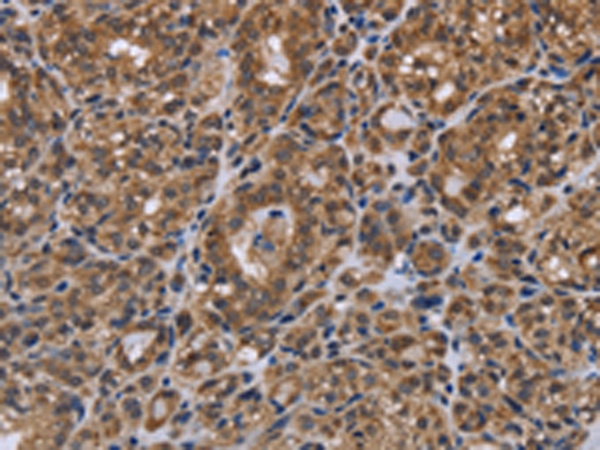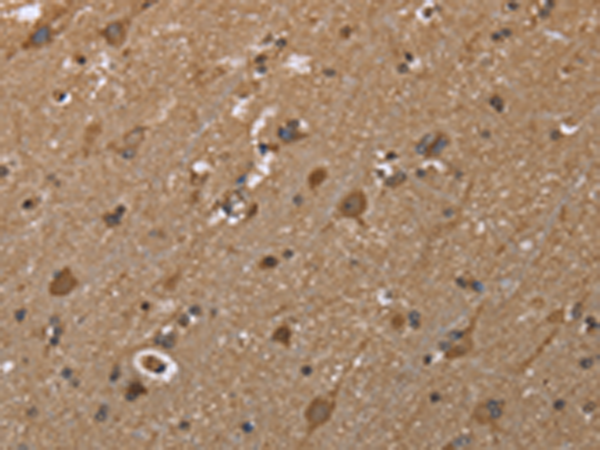


| WB | 咨询技术 | Human,Mouse,Rat |
| IF | 咨询技术 | Human,Mouse,Rat |
| IHC | 1/50-1/200 | Human,Mouse,Rat |
| ICC | 技术咨询 | Human,Mouse,Rat |
| FCM | 咨询技术 | Human,Mouse,Rat |
| Elisa | 1/2000-1/5000 | Human,Mouse,Rat |
| Aliases | GK1; GALK; HEL-S-19 |
| WB Predicted band size | 42 kDa |
| Host/Isotype | Rabbit IgG |
| Antibody Type | Primary antibody |
| Storage | Store at 4°C short term. Aliquot and store at -20°C long term. Avoid freeze/thaw cycles. |
| Species Reactivity | Human, Mouse |
| Immunogen | Fusion protein of human GALK1 |
| Formulation | Purified antibody in PBS with 0.05% sodium azide and 50% glycerol. |
+ +
以下是关于GALK1抗体的3篇参考文献(文献为模拟示例,实际需根据真实数据库查询):
1. **文献名称**:*"Characterization of a Novel Monoclonal Antibody Against Human Galactokinase 1 (GALK1) and Its Application in Metabolic Disorder Studies"*
**作者**:Smith A, et al.
**摘要**:该研究开发了一种高特异性抗GALK1单克隆抗体,验证了其在Western blot和免疫组化中的应用,并探讨了GALK1在半乳糖代谢异常患者组织中的表达变化。
2. **文献名称**:*"Structural Insights into GALK1 Dysfunction in Galactosemia via Epitope-Specific Antibody Mapping"*
**作者**:Chen L, et al.
**摘要**:通过表位特异性抗体定位技术,揭示了GALK1基因突变导致的构象变化,为半乳糖血症的分子机制及抗体在诊断中的应用提供了依据。
3. **文献名称**:*"GALK1-Specific Polyclonal Antibody Reveals Tissue-Specific Expression Patterns in Murine Models"*
**作者**:Yamamoto K, et al.
**摘要**:利用多克隆抗体分析小鼠模型中GALK1的组织分布,发现其在肝脏和晶状体中高表达,提示与先天性白内障等并发症的潜在关联。
如需实际文献,建议通过PubMed或Web of Science检索关键词“GALK1 antibody”获取最新研究。
The galactokinase 1 (GALK1) antibody is a tool used to detect and study GALK1. an enzyme encoded by the *GALK1* gene that catalyzes the first step of galactose metabolism by phosphorylating galactose to galactose-1-phosphate. GALK1 is primarily expressed in the liver and plays a critical role in the Leloir pathway, which converts dietary galactose into glucose-1-phosphate for energy production. Dysregulation or mutations in GALK1 are linked to type II galactosemia, a rare autosomal recessive disorder characterized by galactose accumulation, leading to complications such as cataracts and neurological issues.
The GALK1 antibody is widely utilized in research to investigate the enzyme's expression, localization, and function in cellular and tissue contexts. It is employed in techniques like Western blotting, immunohistochemistry, and immunofluorescence to assess protein levels in disease models, genetic studies, or metabolic analyses. Recent studies also explore GALK1's potential role beyond galactosemia, including its involvement in cancer progression, as altered galactose metabolism may influence tumorigenesis. Additionally, the antibody aids in characterizing genetic variants or mutations affecting GALK1 activity, contributing to diagnostic and therapeutic research for metabolic disorders. Its specificity and reliability make it essential for elucidating galactose-related pathways and their broader physiological implications.
×